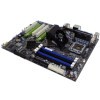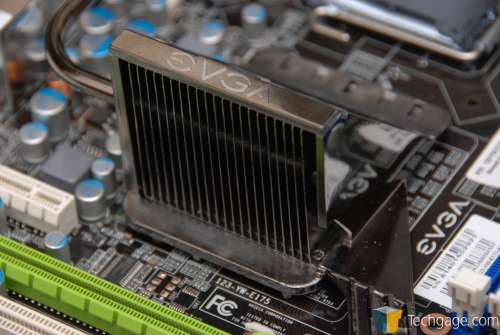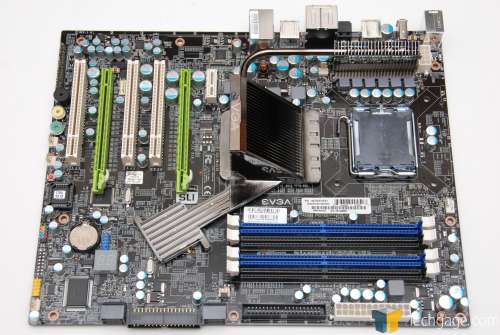- Qualcomm Launches Snapdragon 4 Gen 2 Mobile Platform
- AMD Launches Ryzen PRO 7000 Series Mobile & Desktop Platform
- Intel Launches Sleek Single-Slot Arc Pro A60 Workstation Graphics Card
- NVIDIA Announces Latest Ada Lovelace Additions: GeForce RTX 4060 Ti & RTX 4060
- Maxon Redshift With AMD Radeon GPU Rendering Support Now Available
eVGA nForce 750i SLI FTW

Need an SLI motherboard but have less than $200 to spend? No need to stress, as the 750i SLI chipset was designed with you in mind. We are taking a look at how eVGA put the chipset to good use in the form of their 750i SLI FTW board, which offers solid performance and overclocking-ability, in addition to great board design.
Page 9 – Final Thoughts
eVGA hasn’t been building motherboards half as long as some other companies, but you wouldn’t know it with such well-rounded offerings such as the 750i SLI FTW. The board isn’t without faults, but it’s well-thought-out, all the way down to the included accessories.
Let’s start with the board layout itself. The only thing to really bother me about this board isn’t actually something under eVGA’s control… the lack of S-ATA ports. NVIDIA’s 750i chipset limits the number to four, so any 750i board out there will top out at that number, unless the manufacturer chooses to add more with the help of a secondary chip. I haven’t seen this, however, and I’m sure the reasons are due to extra cost.
In the instance you’ll need more than four ports (and today, it’s not hard to require that), then you’re best choice is to simply choose a 780i board, which comes equipped with six. Sadly, even that’s not-so-impressive, as many other P45/X38 boards we’ve taken a look at in the past have featured eight, which is an entirely sweet number as it allows a lot of freedom.
That rant aside, the board features a great design and it’s one I cannot find a real complaint with. The four S-ATA ports are cleverly placed and are vertically-mounted, making installation a breeze. Other connectors are well-placed as well though… even the ATX chassis connectors. Lastly, the fact that the board includes five fan connectors (excluding the CPU fan) is fantastic. I wish all motherboard builders were so kind.
From a performance perspective, the 750i SLI FTW delivers as we expected. Some results were a little lower than we would have hoped, but it’s not unusual to see a board excel in one benchmark and not in another. There is no such thing as a “perfect” motherboard.
The biggest area for concern would be with power consumption… it’s truly staggering how this chipset manages to suck down 24W at a minimum over our other boards. Compared to our ASUS P5Q Deluxe, a P45-based board, the differences are even more incredible. There, the eVGA board draws 42W more at idle, and 60W at load.
Again, these differences might not mean much to some, but the fact that they are so large strikes me as a bit odd. Hopefully the next NVIDIA chipset iteration (if there is one), will vastly improve power consumption. NVIDIA is now one of the few companies that release new products that actually draw more power than the last generation, and that can’t go on forever.
While the power consumption is high, so is the overclocking-ability. On the Quad-Core side, 450MHz FSB was our top-end clock, which isn’t majorly impressive, but reasonable nonetheless. Given that this board only has a 6 phase power solution, compared to a few other recent boards that feature 8 and higher, it does seem that having a more robust power solution can improve top overclocks.
On the Dual-Core side, things improved greatly, reaching 513MHz FSB. While still not “incredible” by certain standards, it should suffice for most any overclocker who acquires one of these boards.
While eVGA’s 750i SLI FTW board has some select downsides, it has far more upsides. It comes in at a reasonable price (although certain 750i SLI competition can be had for much less), features a great board layout, includes a great set of accessories and has good overclocking-ability. If you are keen on getting set up with SLI, this board will definitely set you off on the right foot.
-
Pros
- Board design is top-notch.
- Solid overclocking-ability.
- Good performance, in-line with our other boards.
- 10 USB ports possible using add-in port extender.
- BIOS is easy to navigate and use, very lenient in the event of failed overclocks.
-
Cons
- 750i chipset limits the board to 4 S-ATA ports.
- Power consumption far exceeds our other non-NVIDIA boards.
Discuss in our forums!
If you have a comment you wish to make on this review, feel free to head on into our forums! There is no need to register in order to reply to such threads.
Support our efforts! With ad revenue at an all-time low for written websites, we're relying more than ever on reader support to help us continue putting so much effort into this type of content. You can support us by becoming a Patron, or by using our Amazon shopping affiliate links listed through our articles. Thanks for your support!







